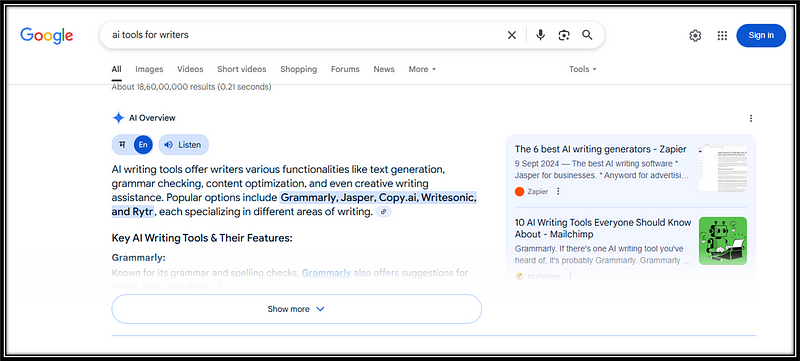SEO is continually evolving, shifting away from simple keyword-based strategies toward a more holistic, AI-driven approach that prioritises user experience and content quality.
Gone are the days when users patiently scrolled through pages of results.
With attention spans reportedly shrinking, people want quick, concise answers to their questions.
The rules of SEO are changing!
Understand AI Overviews, shrinking attention spans, and how to create blog posts that rank high in today’s AI-powered search.
Here’s an example: AI Tools For Writers

AI Overviews cater precisely to this need by providing summarised information directly at the top of the search results page.
The popular AI tools for writers include Rytr, Grammarly, Jasper, Copy AI, and Writesonic.
This means your content needs to deliver its core message quickly and clearly.
Think of it as providing the “TL;DR” (Too Long; Didn’t Read) version upfront, while still offering the depth for those who want to explore further.
Key changes include the rise of AI answers in search, a greater emphasis on user intent, and the need for multi-channel optimisation.
Learn How AI IS Changing SEO at Sureshh.com
See how the SEO landscape is changing with AI, and it’s clear that adapting AI SEO is no longer an option, but a necessity.
1. AI-Powered Search and Its Impact:
- AI-driven SEO: Search engines are increasingly relying on AI and machine learning to understand user intent and deliver more relevant results.
- Generative AI: Tools like ChatGPT are impacting the way content is created and consumed, leading to a need for SEO strategies that adapt to AI-generated content.
- Direct answers on SERPs: Search engines are providing more direct answers to user queries within search results pages, reducing the need for clicks to external websites.
- AI as an SEO co-pilot: AI tools are being used to automate research, generate content ideas, and analyse market trends, making SEO workflows more efficient.
2. Shift to User-Centric Optimisation:
- Focus on user intent: SEO is moving beyond keyword matching to understanding the underlying reasons behind search queries and providing content that fulfils those needs.
- Human-first approach: Content needs to be more conversational, engaging, and relevant to the user’s context, rather than simply optimised for keywords.
- Multi-channel approach: SEO is expanding beyond traditional search engines to include social media platforms, AI-powered discovery engines, and other channels.
- Audience-first thinking: Understanding user behavior and segmentation is crucial for effective SEO in a fragmented landscape.
3. The Evolution of SEO Techniques:
- Algorithm Optimization (AO): Understanding and adapting to the specific algorithms of different platforms, including social media, is becoming more important.
- Technical SEO enhancements: Ensuring proper server-side rendering and resolving JavaScript-related issues are crucial for maintaining visibility in search results.
- Content quality and relevance: High-quality, engaging, and informative content that addresses user needs is more important than ever.
- Growth and visibility: SEO is evolving into a broader strategy focused on driving meaningful presence and performance across multiple channels.
The Future of SEO
SEO is not dead. It’s an upgrade with AI powers.
While the landscape is changing, SEO will remain a critical process for online visibility.
The SEO landscape is AI-enhanced, not AI-replaced.
AI is not replacing SEO, but rather enhancing it, making it more efficient and effective.
As an SEO expert, your focus should be on 2 important things: adaptation and innovation.
Those who can adapt to the latest SEO trends and leverage AI-powered tools will have a competitive advantage.
Optimising for the AI-Powered SEO Future
So, how do you make your content shine in this new AI-enabled SEO environment?
It’s about blending traditional SEO best practices with a new focus on AI readability.
Your content still needs to be found by search engines, so keywords, backlinks, and technical SEO remain important.
However, for AI Overviews, you’ll need to emphasise clear headings, short paragraphs, bullet points, and even FAQ sections that directly answer common questions. You can ask for a GEO expert’s help for AI overviews.
Think of it as creating content that is “AI-friendly” – easy for the algorithms to understand, categorise, and present as a trusted summary.
By adapting these new changes, your website can thrive in the evolving world of AI search.